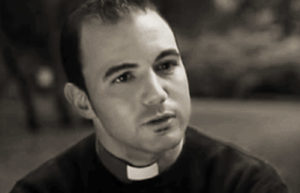When Jesus had risen, early on the first day of the week,
he appeared first to Mary Magdalene…
When they heard that he was alive
and had been seen by her, they did not believe.
After this he appeared in another form
to two of them walking along on their way to the country.
They returned and told the others;
but they did not believe them either.
But later, as the Eleven were at table, he appeared to them
and rebuked them for their unbelief and hardness of heart
because they had not believed those
who saw him after he had been raised.
He said to them, “Go into the whole world
and proclaim the Gospel to every creature.” (Saturday readings in the Octave of Easter)
God speaks to His children in myriad ways… pre-eminent among them the voice of the Apostles and their successors in Sacred Tradition, through the Scriptures, through the lives of His witnesses, through the “still small voice” in prayer, through the “fifth gospel” of creation (Aquinas), and of course, through the charisms of the Holy Spirit such as words of knowledge and prophecy. This last category is where we find the element of so-called “private revelations” that God grants to individuals through locutions, visions, or apparitions.
…the place of prophecy is eminently the place God reserves for Himself to intervene personally and anew each time, taking the initiative… through charisms, [He] reserves for himself the right to intervene directly in the Church to awaken it, warn it, promote it and sanctify it. —“Das Problem der Christlichen Prophetie,” 181; cited in Christian Prophecy: The Post-Biblical Tradition, by Hvidt, Niels Christian, p. 80
In today’s readings, we catch some of the very first “private revelations” post-Resurrection in the New Testament. We also see the first responses, which are typical throughout every generation: doubt, unbelief, and hardness of heart. While we are not given a detailed description of the interior life of the Eleven apostles at that moment, we can infer that Jesus deemed their skepticism excessive.
At the same time, the Lord does not linger on this fact. Rather, He refocuses the Apostles on the purpose of His apparitions:
Go into the whole world and proclaim the Gospel to every creature.
Private revelation is given to the Church precisely to turn her back toward Public Revelation — the mission and purpose of the Church:
Evangelizing is in fact the grace and vocation proper to the Church, her deepest identity. She exists in order to evangelize, that is to say, in order to preach and teach, to be the channel of the gift of grace, to reconcile sinners with God, and to perpetuate Christ’s sacrifice in the Mass, which is the memorial of His death and glorious resurrection. —POPE ST. PAUL VI, Evangelii Nuntiandi, n. 14
Too often, souls can become ensnared in the more sensational aspects of alleged private revelation — even if it is legitimate — like future chastisements, the Warning, “signs” in the sky, the concept of refuges, the identity of the Antichrist, alleged “secrets” and so forth. On the one hand, if Heaven is legitimately speaking of these things, then one ought not “despise” them while at the same time testing them and retaining what is good (cf. 1 Thessalonians 5:20-21). But it is always necessary to come back to the essential, to the Public Revelation of the Church (the “deposit of faith”), which contains all that is necessary for our salvation.
On this point, it should be kept in mind that prophecy in the biblical sense does not mean to predict the future but to explain the will of God for the present, and therefore show the right path to take for the future. —Cardinal Ratzinger (POPE BENEDICT XVI), “Message of Fatima”, Theological Commentary, www.vatican.va
At the same time,
The prophet is someone who tells the truth on the strength of his contact with God—the truth for today, which also, naturally, sheds light on the future. —Cardinal Joseph Ratzinger (POPE BENEDICT XVI), Christian Prophecy, The Post-Biblical Tradition, Niels Christian Hvidt, Foreword, p. vii)
We need to remember these things lest we, too, require a gentle rebuke from the Lord — either for excessive skepticism toward prophecy and the supernatural… or for failing to put it all back in a healthy and crucial perspective. At the end of the day, we are called to carry on the mission of the Church, which is to bring the Gospel to the “peripheries” of society, as the late Pope Francis reminded the Church in the first days of his pontificate.
We get the best “picture” of what this all looks like in the bold witness of Peter and John who combined both the light of the “private revelation” they experienced of the Resurrected Jesus in the upper room, alongside their three years of receiving the infallible teachings of Jesus. The former simply confirmed the latter.
It is not [private revelations’] role to improve or complete Christ’s definitive Revelation, but to help live more fully by it in a certain period of history. Guided by the Magisterium of the Church, the sensus fidelium knows how to discern and welcome in these revelations whatever constitutes an authentic call of Christ or his saints to the Church. —Catechism of the Catholic Church, n. 67
In neither despising the prophetic, nor being overly intellectual, Peter and John became models of what being fishers of men looks like:
It is impossible for us not to speak about what we have seen and heard. (Second reading)
—Mark Mallett
Related Reading



 Alicja Lenczewska
Alicja Lenczewska



 Elizabeth Kindelmann
Elizabeth Kindelmann Through what became The Spiritual Diary, Jesus and Mary taught Elizabeth, and they continue to instruct the faithful in the divine art of suffering for the salvation of souls. Tasks are assigned for each day of the week, which involve prayer, fasting, and night vigils, with beautiful promises attached to them, laced with special graces for priests and the souls in purgatory. In their messages, Jesus and Mary say that The Flame of Love of the Immaculate Heart of Mary is the greatest grace given to mankind since the Incarnation. And in the not-so-distant future, her flame will engulf the entire world.
Through what became The Spiritual Diary, Jesus and Mary taught Elizabeth, and they continue to instruct the faithful in the divine art of suffering for the salvation of souls. Tasks are assigned for each day of the week, which involve prayer, fasting, and night vigils, with beautiful promises attached to them, laced with special graces for priests and the souls in purgatory. In their messages, Jesus and Mary say that The Flame of Love of the Immaculate Heart of Mary is the greatest grace given to mankind since the Incarnation. And in the not-so-distant future, her flame will engulf the entire world. Father Stefano Gobbi
Father Stefano Gobbi Why Gisella Cardia?
Why Gisella Cardia? Thirdly, the messages have frequently been accompanied by visible phenomena, photographic evidence found in In Cammino con Maria, which cannot be the fruit of subjective imagination, notably the presence of the stigmata on Giselle’s body and and the appearance of crosses or religious texts in blood on Gisella’s arms. See the pictures taken from her apparition website
Thirdly, the messages have frequently been accompanied by visible phenomena, photographic evidence found in In Cammino con Maria, which cannot be the fruit of subjective imagination, notably the presence of the stigmata on Giselle’s body and and the appearance of crosses or religious texts in blood on Gisella’s arms. See the pictures taken from her apparition website 
 Jennifer
Jennifer Why Manuela Strack?
Why Manuela Strack?

 Why the Visionaries of Our Lady of Medjugorje?
Why the Visionaries of Our Lady of Medjugorje? Why Pedro Regis?
Why Pedro Regis? Why the Servant of God Luisa Piccarreta?
Why the Servant of God Luisa Piccarreta? of the saints. It wasn’t until she became a “Daughter of Mary” that the nightmares finally ceased at the age of eleven. In the following year, Jesus began to speak interiorly to her especially after receiving Holy Communion. When she was thirteen, He appeared to her in a vision that she witnessed from the balcony of her home. There, in the street below, she saw a crowd and armed soldiers leading three prisoners; she recognized Jesus as one of them. When He arrived beneath her balcony, He raised his head and cried out: “Soul, help Me!” Deeply moved, Luisa offered herself from that day on as a victim soul in expiation for the sins of mankind.
of the saints. It wasn’t until she became a “Daughter of Mary” that the nightmares finally ceased at the age of eleven. In the following year, Jesus began to speak interiorly to her especially after receiving Holy Communion. When she was thirteen, He appeared to her in a vision that she witnessed from the balcony of her home. There, in the street below, she saw a crowd and armed soldiers leading three prisoners; she recognized Jesus as one of them. When He arrived beneath her balcony, He raised his head and cried out: “Soul, help Me!” Deeply moved, Luisa offered herself from that day on as a victim soul in expiation for the sins of mankind. immobile, rigid-like state that appeared almost as if she were dead. It was only when a priest made the sign of the Cross over her body that Luisa regained her faculties. This remarkable mystical state persisted until her death in 1947—followed by a funeral that was no little affair. During that period in her life, she suffered no physical illness (until she succumbed to pneumonia at the end) and she never experienced bedsores, despite being confined to her little bed for sixty-four years.
immobile, rigid-like state that appeared almost as if she were dead. It was only when a priest made the sign of the Cross over her body that Luisa regained her faculties. This remarkable mystical state persisted until her death in 1947—followed by a funeral that was no little affair. During that period in her life, she suffered no physical illness (until she succumbed to pneumonia at the end) and she never experienced bedsores, despite being confined to her little bed for sixty-four years. Why Simona and Angela?
Why Simona and Angela?
 Valeria Copponi
Valeria Copponi